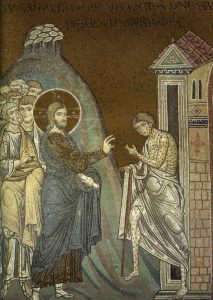Today is the 3rd Sunday after Epiphany. When we completely go through all the liturgical festivities, we tend to be strong in our faith. The grace from God is enormously flowing to recreate us according to His own image. May God, who is merciful and kind, slow to anger and abundant in love reflect the way we treat others.
The first reading from the letter of St. Paul to the Romans narrates to us how Paul continues to call for the good behavior for those who receive the renewal of mind and spirit as their rightful response to God’s mercies. Paul exhorted them to, “Think the same thing toward one another; do not think highly of yourself, but associate with the lowly; do not become proud in your own estimation.” Paul echoes Jesus in calling attention to love as the key moral norm for God’s people. He assumes that his audience knows that they are to love; he exhorts them to make their love for each other genuine. Paul begins his exhortation to “let love be genuine” (verse 9), and then shows what this love looks like. Generally, true love is summed up like this: Hate what is evil and cling to what is good (v9b). Those who have offered their bodies as a living sacrifice and renewed their minds may discern what is good (vv1-2).
In this context, Paul’s purpose is to press Christians to live in the light of God’s mercies, not future vindication. Our primary job is to show love, not to act as judge. Paul showed what happens when people pass judgment on others: they end up falling under judgment themselves (Romans 9:12:21). We must show mercy by tending to enemies in need. By treating opponents like family, then opponents are shamed (Proverbs 25:21-22a). The image of the heaping of burning coals on the enemy’s head suggests making him red in the face. In doing so, we overcome evil with good, showing that if we “cling to what is good,” we are expressing the definition of true love.
The gospel from St. Matthew reminds us that Jesus Christ has authority over everything; thus we are to live our lives in total submission to His will. It is only through humble resignation to Him that we can experience the healing power we seek from Him. This is what happened to both the leper and the Centurion. There are two stories in the gospel today.
First, Jesus heals and transforms a leper. In the Book of Leviticus, lepers were considered “unclean” because leprosy was a feared disease. They were considered marginalized people, people in the periphery. They were outsiders. However, a leper came to Jesus with humble expression of faith, “Lord, if Thou wilt, Thou canst make me clean.” It was from his heart, expressing his genuine need and dependence on Jesus. That was an act of poverty in spirit. Jesus responded, “I WILL. BE THOU MADE CLEAN.” Jesus’ gesture touching the leper was “a contagious touch of His holiness.” He was not afraid of being infected with the leprosy. The leper was made clean.
This leper who was an outsider taught us to be direct in asking Jesus about any of our needs because of his humility and faith. Also, the world today needs Jesus’ touch. It is through us that we effect any kind of change to other people who are suffering from various problems and diseases by leading them to Christ. Authentic Christian service communicates love through contact and identification with others. It requires our loving tender touch.
Second, Jesus welcomed the request of the Roman Centurion to heal his servant. The Centurion felt unworthy to even have the Lord come into his house. However, his profession of faith amazed Jesus when he uttered these powerful words, saying, “Lord, I am not worthy that Thou should enter under my roof; but only say the word and my servant shall be healed,” This is a clear recognition of Christ’s authority, which is sufficiently enough to effect the healing he expected without being present. This is a strong affirmation of his faith as compared to any other person. Being a Roman Officer, he did not impose or demand something, but he came in a spirit of humility and confidence in the Lord for his servant. One good thing, the centurion threw himself on God’s mercy. Hence, Jesus made this Centurion a model of faith for us.
Some of us lack humility and genuine faith. Jesus today reminds us that for self-righteous people it is difficult to experience a miracle of healing. Proud people seem to ignore that we need Jesus’ healing and intervention and fail to perceive our own unworthiness. Relying too much on personal effort, prayer may or may not happen because there is no genuine recognition of God’s presence and grace which we desperately need.
May we learn from these two stories Christian values and acknowledge our own dependence upon God as believers and followers! Let us be open to be healed and to heal others, especially the least among us.
God bless you!
Fr. Arlon, osa

